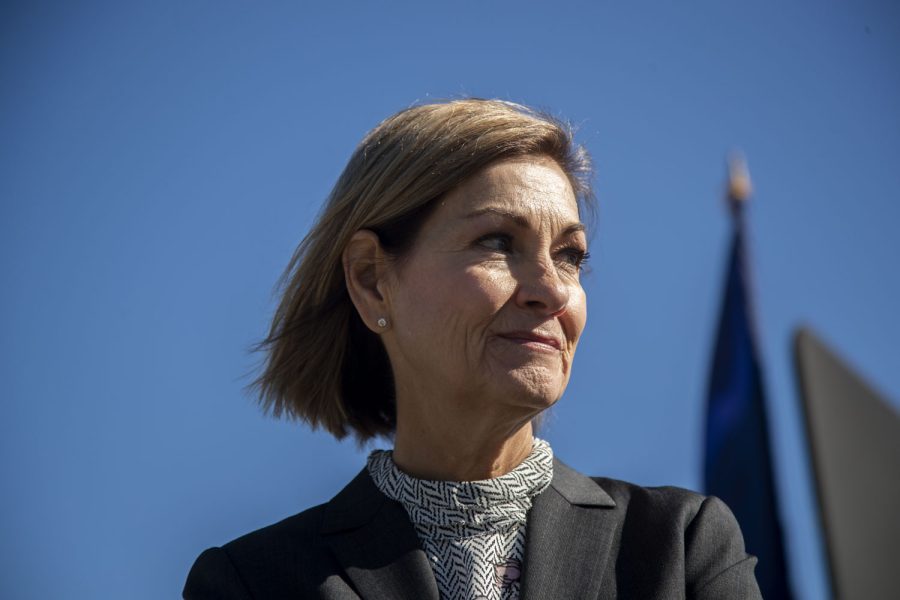Opinion | Iowa budget surplus should be utilized
Gov. Kim Reynolds needs to use the budget surplus to help Iowa.
Iowa Governor Kim Reynolds is seen at a groundbreaking ceremony at the North Liberty University of Iowa hospitals and clinics construction site on Thursday, Oct. 14, 2021.
October 14, 2021
Iowa may be sitting on a surplus of cash, but it’s come at a cost.
The state ended the fiscal year with an extra $1.24 billion, which is the largest surplus in Iowa history. To no surprise, Gov. Kim Reynolds touted this number in a press release and said, “This surplus proves we accomplished exactly what we set out to do — overcome the financial challenges caused by the global pandemic and invest in education, workforce, healthcare, agriculture and technology.”
While Reynolds claimed to be investing in the priorities of the state, sitting on this mountain of cash has done the complete opposite. I’m not here to argue that saving money is necessarily a bad thing. But when funds are being withheld instead of being used to help Iowans that need the money, Reynolds isn’t helping the state.
From withholding COVID-19 relief to decreasing investment in higher education, our governor left the state in a COVID-19 disaster and sacrificed the quality of higher education institutions.
Back in May, Reynolds ordered that extra employment benefits — including the extra $300 per week benefit and other pandemic employment assistance — end in June. The reasoning behind it? The U.S was experiencing low employment, with the federal rate at 6.1 percent and Iowa’s at 3.7 percent. So, Reynolds made the decision that it was time for everyone to get back to work despite Iowans feeling like they were being pushed into an unsafe environment.
One Mount Vernon musician called it life-threatening, according to an article from the Iowa Capital Dispatch.
Despite Reynolds cutting programs such as the Pandemic Unemployment Assistance and Mixed Earners Unemployment Compensation, Iowa is struggling with employment. In fact, restaurants are still having trouble hiring workers, regardless of vaccine availability and unemployment cuts.
It’s no surprise that it didn’t happen as the number of COVID-19 cases increased alongside the rise of the delta variant, making Iowans uneasy about returning to the workforce. Banning vaccine passports and mask mandates contributed too, by removing a layer of necessary protections from the virus.
So, cutting benefits when the state is able to help Iowans who don’t feel safe is frankly irresponsible and poor leadership, especially when the leader enacts policy that makes them feel this way.
And COVID-19 relief isn’t the only area in which Iowans needed financial support. Iowa’s higher education institutions, particularly its public universities, have been swamped with financial woes. In fact, the state’s three public universities lost an estimated net of $185 million from the COVID-19 pandemic — which includes state budget cuts.
In 2020, the Iowa Legislature cut funding by $8 million for fiscal 2021, and Reynolds underfunded the state Board of Regents’ budget request for 2022 by $11 million. Because of the lack of funding, these institutions — like the University of Iowa — needed to make sacrifices, such as laying off 10 faculty members within the UI College of Liberal Arts and Sciences.
Despite Iowa having the finances to assist the three universities, Reynolds and Republicans refuse to invest in Iowa’s higher education institutions and essentially sends the message of “sorry, you’re on your own.”
Just because Iowa may be sitting on a mountain of cash doesn’t mean the state is in tip-top shape. What Iowa needs right now isn’t to keep saving money, but instead to use it to help the state. It may be impressive that Reynolds’ fiscal policies have paid off, but these funds need to be used to invest in the future of the state.
Columns reflect the opinions of the authors and are not necessarily those of the Editorial Board, The Daily Iowan, or other organizations in which the author may be involved.
















